
The Workforce Development Board (WDB) has released its Local Labour Market Planning Report for 2021-2022 — an extensive look at the challenges and opportunities facing both the demand and supply sides of the labour market in Peterborough (City and County), the City of Kawartha Lakes, Northumberland County, and Haliburton County.
An Employment Ontario project funded in part by the Government of Canada and the Government of Ontario, the 116-page document was written by Labour Market Analyst Sandra Wright, who relied heavily on data compiled by WDB’s Labour Market Information Analyst Sean Dooley.
The 2021-22 edition of the Local Labour Market Planning Report is available for viewing and downloading in both English and French at www.wdb.ca/our-projects/.
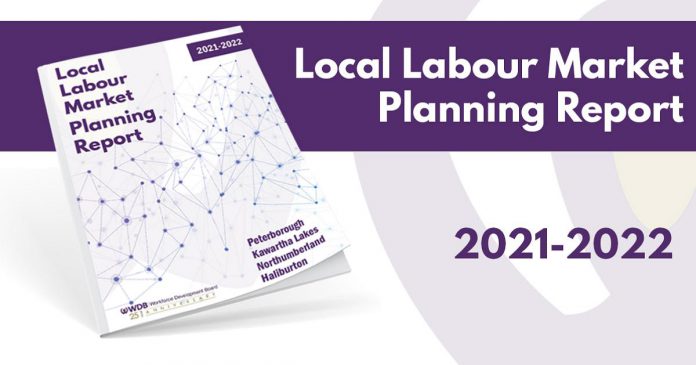
In her executive summary of the report, WDB Chief Executive Officer Jennifer Lamantia notes some of the report’s key findings:
- Compared to two years ago, the number of Employment Insurance beneficiaries in early 2021 was almost triple for women and over double for men.
- The hardest-hit businesses over the last four years were in accommodation and food services, with the pandemic responsible for the majority of job losses. There were also significant employment losses in the retail trade sector as well as in arts, entertainment, and recreation.
- Online job postings began to increase in early 2021 and have remained steady, and are projected to continue to remain above normal levels as further restrictions are lifted and employers continue to recruit for positions.
- The increased hiring demand from employers indicates a renewed confidence in the economy, particularly in health care and social assistance as well as professional, scientific and technical services and public administration.
- The top skills in demand from employers continue to be employability skills, including customer service, attention to detail, organization, teamwork, and written communication.
- The main recruitment barrier for employers is finding qualified and experienced workers, with many employers reporting a general shortage of applicants to many job postings.
- Although the pandemic has created many challenges for businesses, it has also opened up possibilities for remote working that otherwise would never have existed, although the lack of reliable broadband connectivity in some areas is an issue for remote working.
The Local Labour Market Planning Report features many graphs and tables that highlight trends seen in Employment Ontario client data, labour market characteristics, and issues and challenges being experienced in the local labour market. Data sources for the report include input received from local employers, economic development agencies, employment service providers, and the education sector through more than 85 consultations and surveys.
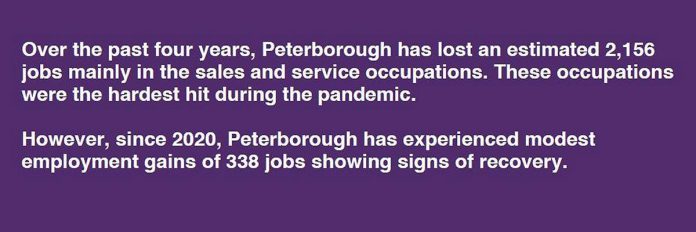
Two employment service providers that provided input for the 2021-22 Local Labour Market Planning Report, and will also make extensive use of its findings, are Employment and Planning Counselling – Peterborough (EPC Peterborough) and Literacy Ontario Central South (LOCS).
According to EPC Peterborough’s manager of employment services Nancy Thompson, the real value of the report for her agency’s work lies in its “snapshot” focus on the local job landscape and associated challenges.
“A lot of the information we usually get is not as local — it’s federal or provincial information,” says Thompson. “What’s going on in Peterborough is different than what’s going on in Toronto and other larger centres. The report gives us a really good idea of what’s going on in our community and in the surrounding communities.”
“It allows us to focus our programming to be able to reach out to those individuals who seem to be having trouble in our area. It allows us to target groups that need more assistance in their job searches and in their career exploration.”
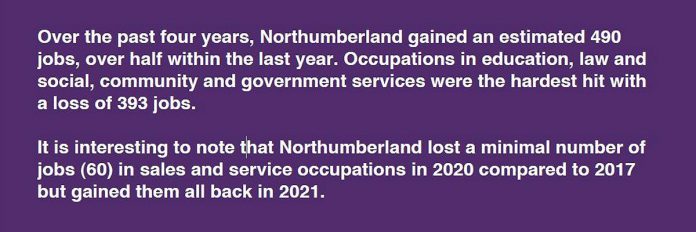
For LOCS, a Peterborough-based agency that provides support to adult training organizations throughout central Ontario, executive director Carrie Wakeford says the report’s comprehensiveness is over the top.
“You’ve got the demographics, you’ve got the employment stats, and you’ve got the trends and action plans,” Wakeford says of the report. “We couldn’t gather this information on our own. What we’d end up doing is pulling from little pieces of things and trying to piece them together and make some sense of what’s happening. We know what’s happening right now because we see it, but the report allows for some looking forward and a bit of prediction of where we’re headed.”
EPC Peterborough’s Thompson agrees, noting her organization is “too busy in the trenches” to gather the kind of information available in the report on their own.
“We’re grateful that it’s available, we’re grateful that it’s literally at our fingertips, and we’re grateful that it applies to our local economy,” she says. “It gives us a big picture look at what is going on in our community. We’re so busy dealing with individuals, sometimes we don’t step back and look at the big picture. This report allows us to do that.”
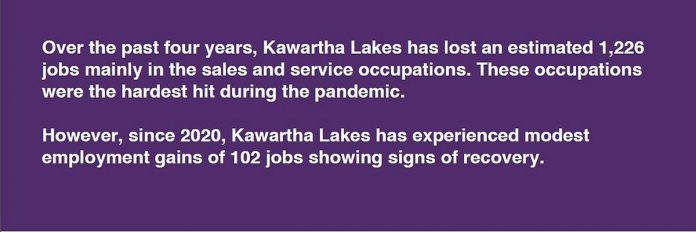
As for how EPC Peterborough applies the information gleaned from the report, Thompson says beyond helping her agency set priorities for “where we spend our marketing money, what programming we run, and what groups we’re going to target,” the report is also a helpful resource when assisting clients looking to retrain.
“We can reference this report with our clients when they’re looking for information on what the prospects are for certain occupations in our region,” she explains.
For Wakeford, the Local Labour Market Planning Report is also an invaluable aid for LOCS’s annual report for the Ministry of Labour, Training and Skills Development that highlights local labour market trends and focuses on the development of plans on how to address identified needs.
“I rely completely on the Workforce Development Board for that information,” says Wakeford. “What are the trends? What are employers looking for? What are the demographics? When you look at all the stats, it’s a bit overwhelming but they break it down by county, which is really helpful.”
Wakeford adds her agency’s Literary Service Plan, an analysis of trends and needs also written for the Ministry and referenced by local literacy-focused organizations in their development of programs for their clients, “just wouldn’t have the same detail” if she didn’t have the Local Labour Market Planning Report at her fingertips.
“I’d still be able to write it but without the detail to back up what I’m saying,” she explains. “It would be like writing a report for college or university without having a source — it becomes opinion.”
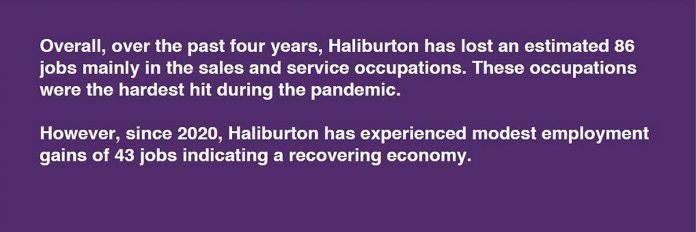
Thompson echoes that comment, saying that having access to the report removes any “guessing” when it comes to advising clients.
“Without tools like this, we wouldn’t be able to help our clients navigate the outside world so they can make appropriate career choices and not spend a lot of time and energy and money only to find those jobs don’t exist,” she says. “This closes the circle of employment counselling.”
A self-admitted “numbers geek” who likes reviewing data, Thompson says “counsellors and numbers don’t always equate.” In recognition of that, she makes herself very familiar with the report’s contents so she can share it with frontline staff as required.
“Employment counsellors, for the most part, use the labour market information and share it with their clients. The demographic information would be something I and my executive director would use more strategically when we’re doing our planning. There are parts that appeal to the frontline staff, and parts that appeal to our management.”
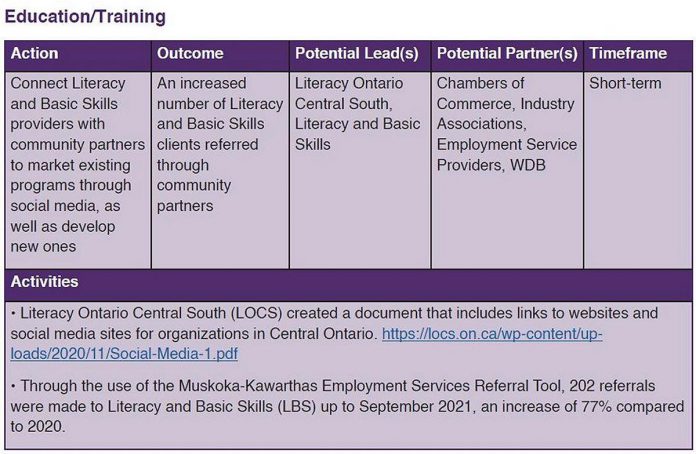
At the end of the day, adds Thompson, the report “validates what we do.”
“It helps us to keep motivated, knowing there are lots of people who need our help and there are lots of people who have had our help.”
The Local Labour Market Planning Report 2021-2022 is available for viewing and downloading in both English and French at www.wdb.ca/our-projects/.
Founded in 1996, WDB is a not-for-profit organization located in Peterborough and serving Northumberland, Peterborough, Kawartha Lakes, and Haliburton. WDB is funded by the Ontario Ministry of Labour, Training and Skills Development to provide labour market information, coordinate employment and training services, and engage employer communities. For more information, visit www.wdb.ca.

This story was created in partnership with the Workforce Development Board.


























